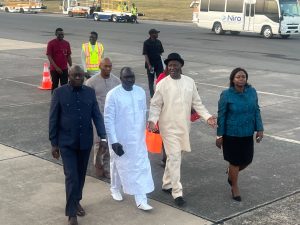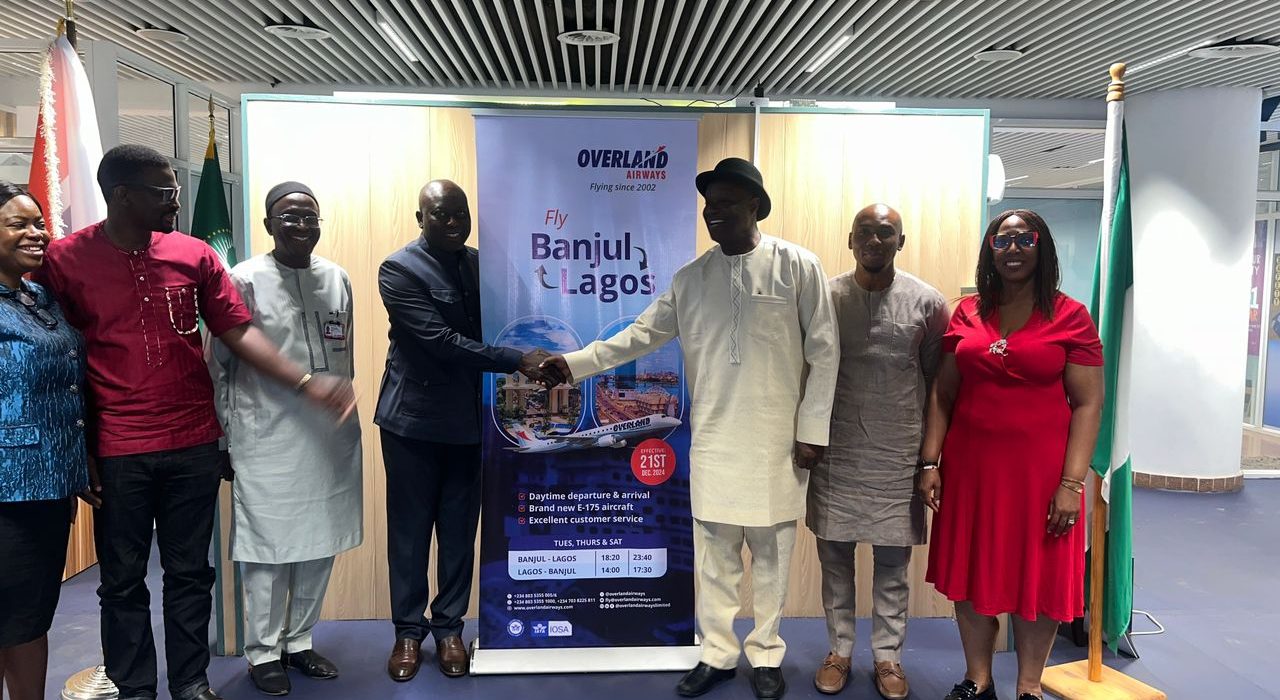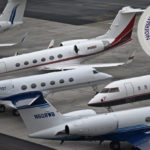
In order to encourage intra-African trade that will boost the region’s economy and create jobs, all the major cities in the continent must be connected through affordable air fares to enable more people travel and trade among themselves.
According to the International Air Transport Association (IATA), the number of air travel in Africa is lower than any other region in the world.
The major disincentives to air travel in Africa are the high cost of ticket, the high cost and multiple airport taxes and immigration bottlenecks.
In 2023, BBC reported that flying within Africa is more expensive than just about anywhere else in the world, noting that travellers pay higher ticket prices and more tax.
“It is often cheaper to fly to another continent than to another African country.
For a quick comparison, flying from the German capital, Berlin, to Turkey’s biggest city, Istanbul, will probably set you back around $150 (£120) for a direct flight taking less than three hours.
“But flying a similar distance, say between Kinshasa, capital of the Democratic Republic of Congo, and Nigeria’s biggest city, Lagos, you will be paying anything between $500 and $850, with at least one change, taking up to 20 hours.
This makes doing business within Africa incredibly difficult, and expensive – and it is not just elite travellers that are affected,” BBC wrote.
BBC quoted IATA, which stated that if just 12 key countries in Africa worked together to improve connectivity and opened up their markets, it would create 155,000 jobs and boost those countries’ Gross Domestic Product (GDP) by more than $1.3 billion.
“Aviation contributes directly to the GDP in every country. It generates work and it activates the economy,” IATA’s regional vice-president for Africa and the Middle East, Kamil al-Awadhi, had said.
SAATM
It is this challenge that begat the vision of the Single African Air Transport Market (SAATM), which is a flagship project of the African Union Agenda 2063, an initiative of the African Union to create a single unified air transport market in Africa to advance the liberalisation of civil aviation in Africa and act as an impetus to the continent’s economic integration agenda. IATA stated that SAATM will ensure aviation plays a major role in connecting Africa, promoting its social, economic and political integration and boosting intra-Africa trade and tourism as a result.
The SAATM was created to expedite the full implementation of the Yamoussoukro Decision, which simply means open sky in Africa that would guarantee easy movement on the continent with little immigration barriers. Now, high taxes piled on the ticket by individual countries make airfares high and added to these are airport charges, which shut up the cost and making it difficult for average citizens to travel by air to do business from one country to another in Africa.
As noted by the BBC report, it is cheaper for Africans to travel to Europe and China to do business than to travel from Nigeria to Cote’Ivoire in West Africa to do similar business because of high cost of ticket and other protocols that could arise. THISDAY investigations revealed that many Africans from Code’Ivoire, Ghana, Senegal and others come to buy commodities in Nigeria by road, which takes them days and it is very cumbersome and discouraging. However, travel experts believe that if airfares are affordable, more Nigerians will travel to Senegal, Niger, Guinea, Mali and other places to buy goods and offer services. Currently, Africans travel to other regions to buy the things that emanate from their continent due to poor air connectivity and high cost of fares.
Overland Airways
Last week Nigeria’s rising carrier, Overland Airways had inaugural flight to Banjul, capital of The Gambia, a day after it launched flight service to Freetown, Sierra Leone. This was a move to realise the set goals of SAATM, which is to connect more people to places in the African continent.
In The Gambia, Overland was welcomed by the top Gambian officials who were elated that the Nigerian carrier would connect the country to other destinations in the sub-region with three-weekly flights with firm plan to become daily in the next few months.
In his welcome speech, the Director General of The Gambia Civil Aviation Authority, Nfansu Bojang, spoke about how to make it easy for Africans to travel and engage in intra-African trade and tourism. Bojang observed that if the goals of SAATM would be realized, air tickets must be made affordable to business travellers, investors and tourists in order to encourage trade among African nations.
The Gambia decided to set example by domesticating the route between the country and Senegal. What it means is that airlines leaving The Gambia to Senegal will not pay international charges and taxes. These are waived to make fares cheaper so that more Africans can afford to fly between the two countries and The Gambia has started the campaign, urging other African countries, especially West and Central Africa to do the same in order to lower the cost of air ticket.
“I never had any doubt in his commitment and confidence in the promotion of the integration of African connectivity.The YD, we know, is more than three decades old. And the YamoussoukroDecision that came was 15 years old now. Now we have SAATM.And SAATM is an AU project. But we don’t want SAATM to be inactive for another 10 years. We want SAATM to take effect now.And for SAATM to take effect now, we must believe in ourselves. And we as regulators and operators and service providers, therefore, owe it to ourselves to support our airlines in any way possible. And one of the ways to do that is to make air travel affordable to our citizens.
“We know one of the key obstacles or bottlenecks in increasing our numbers in connectivity is the high cost of air travel. Most of the travels within our region are government official travels. Our ordinary citizens find it very difficult because the prices are exorbitantly unaffordable; hence, the concept of trying to domesticate destinations between our sub-regional countries. That Is why Gambia and Senegal, as a first step, have agreed and domesticated points between Banjul and Dakar. What this means is all charges associated with international travel will now be waived from the cost of the ticket,” Bojang said.
He noted that waiving those taxes in both countries will see a significant drop in the cost of the ticket.
“It is incumbent on us, therefore, as operators of airports and regulators to do whatever we can and emulate our counterparts in the developed world, like in the EU, where you can have travel between states for $30. There are no destinations between Africa, African countries, where you can travel for less than $100. And if they can do it, we can do it. But if we try to hold on to the high taxes, then we will not go.But if we reduce the cost of travel, then economies of scale is bound to kick in and the numbers will shoot up. So whatever we lose in the short term, by giving discount, we are sure to regain in the long term. So we are happy to have Overland Airways here,” he added.
Fifth Freedom
Speaking in the same vein, the Gambian Minister of Transport, Works and Infrastructure, Mr. Ebrima Sillah, said the Gambian government has granted Overland Airways fifth freedom rights to enhance regional air connectivity and foster economic growth.
According to him, the fifth freedom right will enable the airline operate flights between two foreign countries while originating from their home base and this will enhance the optimization the airline’s operations, expand networks, and serve underserved routes.
The Minister said The Gambia granted fifth freedom right to Overland Airways because of its commitment to regional integration and the vision of SAATM and the country’s plan to deepen its tourism market with the hope that Overland Airways will bring tourists and entrepreneurs to the West Africa nation to enjoy its beaches and top hospitality offered by the many resorts and hotels located along the beautiful beaches of The Gambia.
“The Ministry of Transport, Works and Infrastructure believes that establishing direct air links between Lagos and Banjul will greatly benefit the two sister countries, as it will enable greater movement of our people, which will lead to wider economic benefits and prosperity. Therefore, I wish to assure you of my Ministry’s commitment to provide all necessary support to the airline and all those that are interested in establishing their industries in the Gambia, in the form of incentives, granting of rights and auto routes, as well as designation where necessary.
“As a SAATM PIP State and founding member of the Banjul Accord Group (BAG), the decision to grant Overland Airways Fifth Freedom Rights aligns with Article 3.1 of the Yamoussoukro Decision (YD). I wish Overland Airways every success in its Banjul operation, and I am confident that this service will unlock the great potential of our air transport industry, leading to improved load factors for airlines and others that intend to operate in the Gambia,” he said.
Connectivity
The representative of Charges D’ Affaires of the Nigeria High Commission, Banjul, Kelechi Nwosu, also commended Overland Airways for the bold step it has taken to connect destinations in West Africa.
“Connectivity is not just about moving people and goods. It is about moving ideas, expanding opportunities, opening new pathways for progress. With this inaugural flight, Overland Airways is helping to further bridge the gap between fraternal brothers, Nigeria and the Gambia.
“Two countries that, while geographically separated, share deep historical, cultural, and economic ties. Today’s occasion builds on an already laid foundation for a more prosperous future, one where West African nations grow together through shared economic opportunities. In this regard, Nigeria, as one of the continent’s largest economies, and the Gambia, with its growing market and strategic position on the Atlantic coast, both stand to benefit from closer economic collaboration.
He noted that the airline’s launch of service to The Gambia,“is not just a milestone for Overland Airways, but a reflection of the airline’s commitment to supporting regional integration and development.”

He reiterated that Overland Airways has been at the forefront of facilitating air travel in West Africa, connecting key cities within Nigeria and beyond. This new route to The Gambia underscores the airline’s vision and provides more accessible, reliable, and efficient transport services that support both economic development and human connectivity.
In his speech, the Chief Operating Officer (CEO) of Overland Airways, Captain Edward Boyo, who is SAATM Ambassador for West and Central Africa, said: “Overland Airways is very pleased to be here today. Today, Overland Airways presents itself under the African Union, the African Civil Aviation Commission, Single Air Transport Market programme, which is a program designed to open the skies of Africa and raise the integration of African states.
“Air travel is currently, I would say, confined to the well-to-do. But we are trying to make air transport affordable and available for everybody so that African continent can progress in economy, in trade, and in the integration of people. Our flight from Lagos to Banjul takes 3 hours 30 minutes.”
High Taxes, High Airfares
Earlier in the year, the Managing Director of Asky Airlines, Mr. Esayas WoldeMaria, had frowned at the high cost of tickets in Africa and established that air travel in Africa is costly and cumbersome due to huge government taxes and immigration bureaucracies, a development that is retarding economic growth of the African continent.
WoldeMaria said there was need for Africa to integrate more for its economic development, insisting that government must cut down on the huge taxes charged on air travel that are significant disincentive to travel, trade and tourism.
He regretted that the enormous taxes collected by governments of various countries in Africa were not ploughed back to develop aviation infrastructure and that explained why Africa has undeveloped airport infrastructure, adding that Africans would have had freer movement if airfares are low and travel by Africans in Africa is visa free.
WoldeMaria stressed that there is stronger unity in West Africa compared to other regions, but travel in West Africa is cumbersome and costly due to taxes and charges, urging for drastic reduction of immigration protocols to enhance trade and higher economic growth.
If African countries want to change their poor representation in the global rating of passenger movement by air, increase internally generated wealth, create millions of jobs and encourage inter-African trade and tourism, African leaders should disrobe air tickets, the many clusters of taxes that made air travel a very expensive experience in the region.






